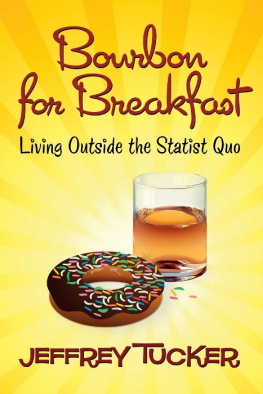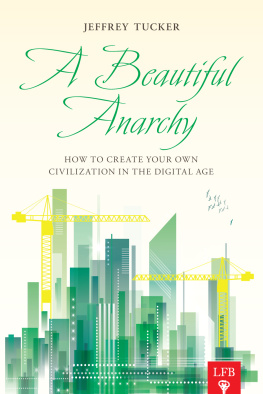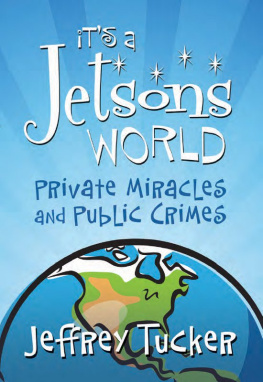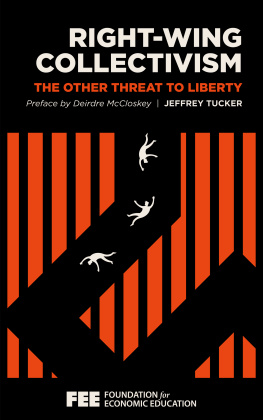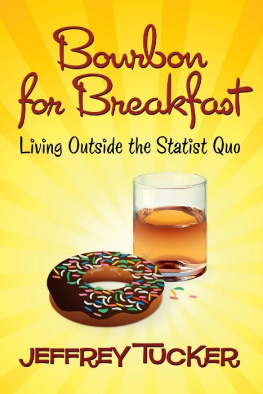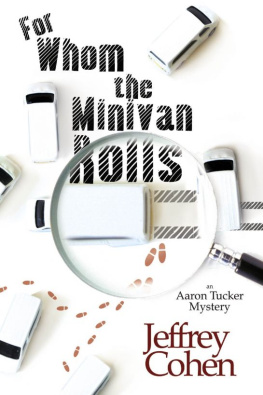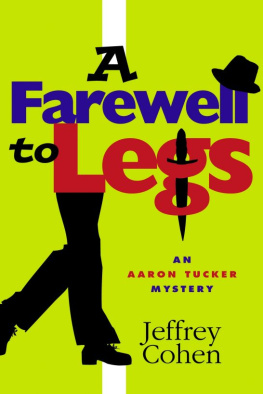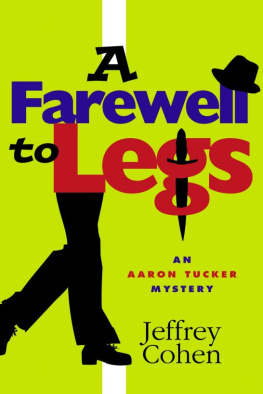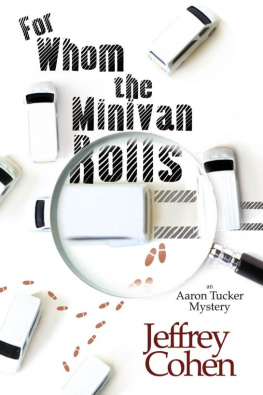Jeffrey A. Tucker - Bourbon for Breakfast: Living Outside the Statist Quo
Here you can read online Jeffrey A. Tucker - Bourbon for Breakfast: Living Outside the Statist Quo full text of the book (entire story) in english for free. Download pdf and epub, get meaning, cover and reviews about this ebook. genre: Romance novel. Description of the work, (preface) as well as reviews are available. Best literature library LitArk.com created for fans of good reading and offers a wide selection of genres:
Romance novel
Science fiction
Adventure
Detective
Science
History
Home and family
Prose
Art
Politics
Computer
Non-fiction
Religion
Business
Children
Humor
Choose a favorite category and find really read worthwhile books. Enjoy immersion in the world of imagination, feel the emotions of the characters or learn something new for yourself, make an fascinating discovery.
- Book:Bourbon for Breakfast: Living Outside the Statist Quo
- Author:
- Genre:
- Rating:3 / 5
- Favourites:Add to favourites
- Your mark:
- 60
- 1
- 2
- 3
- 4
- 5
Bourbon for Breakfast: Living Outside the Statist Quo: summary, description and annotation
We offer to read an annotation, description, summary or preface (depends on what the author of the book "Bourbon for Breakfast: Living Outside the Statist Quo" wrote himself). If you haven't found the necessary information about the book — write in the comments, we will try to find it.
Bourbon for Breakfast: Living Outside the Statist Quo — read online for free the complete book (whole text) full work
Below is the text of the book, divided by pages. System saving the place of the last page read, allows you to conveniently read the book "Bourbon for Breakfast: Living Outside the Statist Quo" online for free, without having to search again every time where you left off. Put a bookmark, and you can go to the page where you finished reading at any time.
Font size:
Interval:
Bookmark:


The title of this book is drawn from one of those defining moments in life in which a small phrase* shatters the social-cultural convention and reveals completely new possibilities. I tell the story herein in the essay on morning drinking.
A great scholar and Southern gentlemena man who has written the ultimate guidebook to the writing of the King James version of the Gospelsinvited me for an early breakfast, 7:00 a.m. and then offered me coffee.
I said, yes, thank you.
He then added: would you like bourbon in that coffee?
What is revealed in that sentence and the shock it elicited? We believe, for whatever reason, that drinking hard liquor in the morning is unseemly, contrary to social norms, something to hide, a habit of the lower classes that is dangerous or even evil.
But are any of these assumptions true? A new form of prohibitionism has swept the country, imposed on us by our government masters and their cultural backers, even as alcohol consumption rises and rises. Evidently, we live two realities: the one the government imposes on us and the one we adopt in our real lives.
What struck me about this mans phrase was how it presumed that he and I were among the rebels against the prevailing ethosthat together we would reject the governments edicts and create our own norms and reality. This is a wonderful model for living a full life. This book is about seeing that just because government mandates certain things and forbids others does not mean that we must follow or even tolerate the official roadmap for our lives.
The seed of truth to the morning-drinking taboo is that doing this every morning would contribute to a less productive life. But on the weekends or when it is not necessary to be at your sober best, or when you are celebrating some special guest, there is surely nothing wrong here.
In any case, there must be some lost aristocratic tradition of adding a splash, else this highly cultivated, highly educated and scholarly Southern gentleman would not have suggested it. In doing so, he was revealing some lost history with a sense of freedom and possibility. To contemplate the suggestion is to imagine a world that does not exist, one that breaks from the status quo and plays with the pluses and minuses of adopting a new way of living.
Most of the essays in this book do just this. They imagine radical new possibilities of living outside the status quo. Or perhaps we should say statist quo because it is the state that is responsible for shaping our world, in brazen ways and also subtle ones that we do not fully realize.
Examples from the book include how and why the hot water in our homes became lukewarm and what can be done about it, how our toilets stopped working properly because of legislation that reduced toilet-tank size, how traffic-law enforcement became a racket for extracting wealth from the population to feed the overlords, how copyright and patent legislation is depriving us of cultural and technological innovation, and how politicians who we think are protecting us are really just taking away our own rights to protect ourselves.
To see the costs of statism is to see what Frederic Bastiat called the unseen. It is about imagining the existence of some possibility that the state has forbidden from existing, playing with that possibility in your mind, and then acting on what has previously been an abstraction and making it a reality. Art helps us accomplish this mental feat, which is why many of these essays deal with literature, movies, culture, and the arts.
But seeing what is wrong with the worldChestertons phraseis only the beginning. Finding the solution, the workaround, is the next necessary step. I try not to highlight problems without also offering a solution of sorts, simply because there is nothing productive or enlightening about despair. Hope comes from imaging a better future that does not yet exist.
Most of the essays in here deal with what are often considered trivial or light topics. But the trivial is quite often very serious, while what we think is serious is often quite trivial, as I try to show. At the same time, I deal with topics that libertarians of my stripe dont often write about, like the ghastly reality of jail (yes, the article is autobiographical) and the problems connected with intellectual property. I make no apology for the fact that the topics are all over the map. Maybe that will make this book more interesting.
An underlying apparatus here is my own formation in economic theory, drawn from my many years of work at the Mises Institute in Auburn, Alabama, and the way that the friendships Ive formed in this connection have gradually led me away from the poison of politics as a viable means of social and economic management.
A parallel part of my life involves the study and practice of music, with a particular focus on what is called early music. Exploring the interaction between culture broadly speaking and political economy is something that happened inadvertantly as Ive been plugging away on thousands of articles over the years, of which this book represents only a sample.
We all need to be part of the project of reimagining freedomof living outside the statist quoelse we will go the way of many societies and civilizations before us: host to a massive apparatus of power and imposition that strangles the growth and ingenuity of people, leading to a stasis that hardly anyone notices until it is too late.
I would like to offer a special note of thanks to Lew Rockwell, who has encouraged the publication of this kind of econo-cultural analysis, and ran many of them on his website, LewRockwell.com. Doug French suggested, even insisted, on collecting them in a book. Many friends, co-workers at the Mises Institute, associates, and loved ones will notice incidents, ideas, and phrases in here that draw from shared experiences and conversations; indeed, there are many senses in which this book is not my own but the result of a community enterprise. They should all know of my gratitude.
January 10, 2006
T he Department of Energy may soon be paying a visit to a certain shower head manufacturer in Arizona. The company is Zoe Industries Manufacturing. It runs Showerbuddy.com, a popular site that sells amazing equipment for bathrooms.
Consumers love the company but one man doesnt. He is Al Dietemann, head of conservation for the Seattle Water Board. Al ordered some products and sent them to BR Laboratories in Hungtington, California, according to the Seattle Post-Intelligencer. And sure enough, Bureaucrat Al gained enough data to report Zoe to the feds, accusing Zoe of blatant violations of environmental protection laws. Now the heat is on.
Whats the big deal? What critical matter of American public life is at stake? Its all about water flow and gallons per minute.
You might have some vague memory from childhood, and perhaps it returns when visiting someone who lives in an old home. You turn on the shower and the water washes over your whole self as if you are standing under a warm-spring waterfall. It is generous and therapeutic. The spray is heavy and hard, enough even to work muscle cramps out of your back, enough to wash the conditioner out of your hair, enough to leave you feeling wholly renewedenough to get you completely clean.
Font size:
Interval:
Bookmark:
Similar books «Bourbon for Breakfast: Living Outside the Statist Quo»
Look at similar books to Bourbon for Breakfast: Living Outside the Statist Quo. We have selected literature similar in name and meaning in the hope of providing readers with more options to find new, interesting, not yet read works.
Discussion, reviews of the book Bourbon for Breakfast: Living Outside the Statist Quo and just readers' own opinions. Leave your comments, write what you think about the work, its meaning or the main characters. Specify what exactly you liked and what you didn't like, and why you think so.

